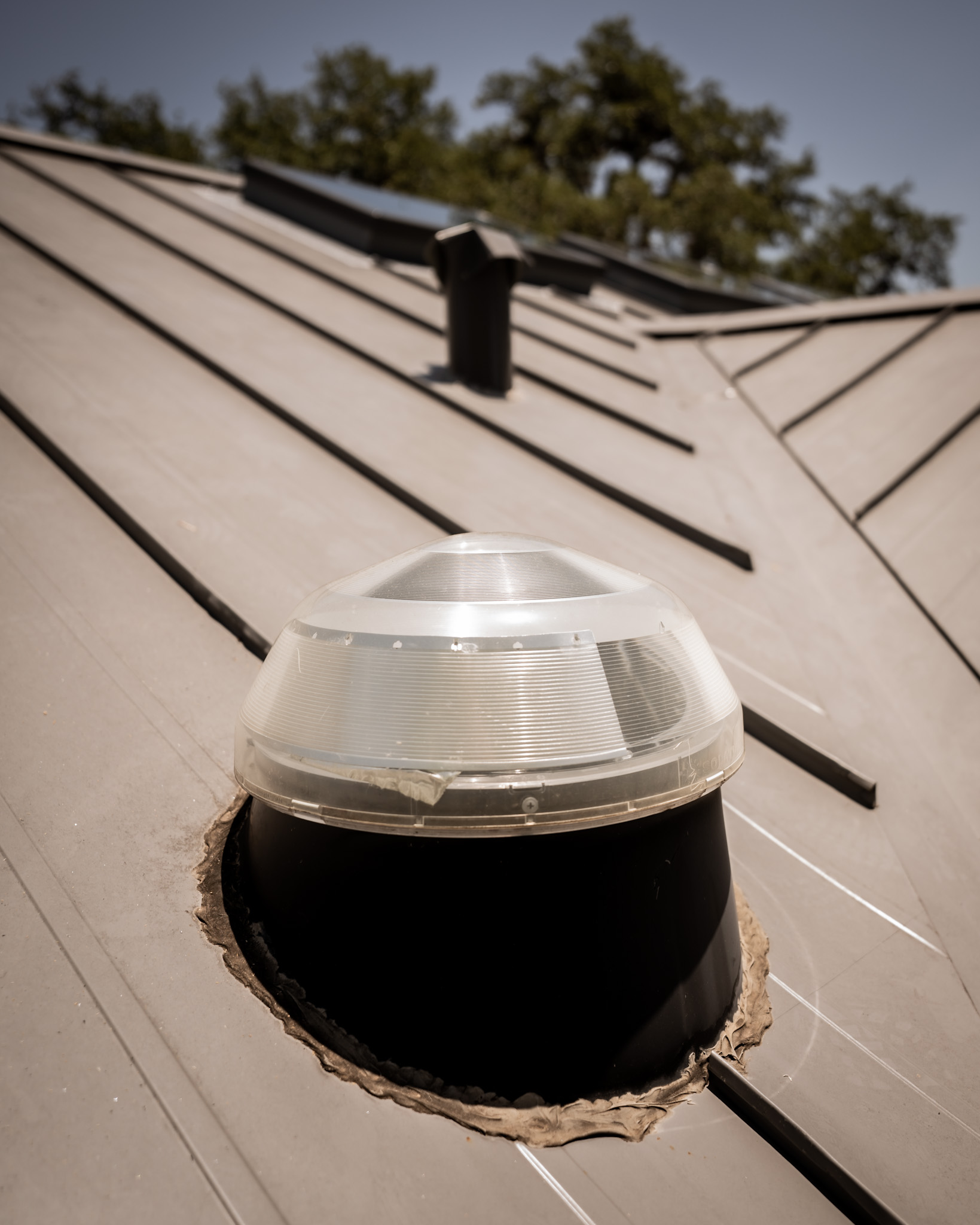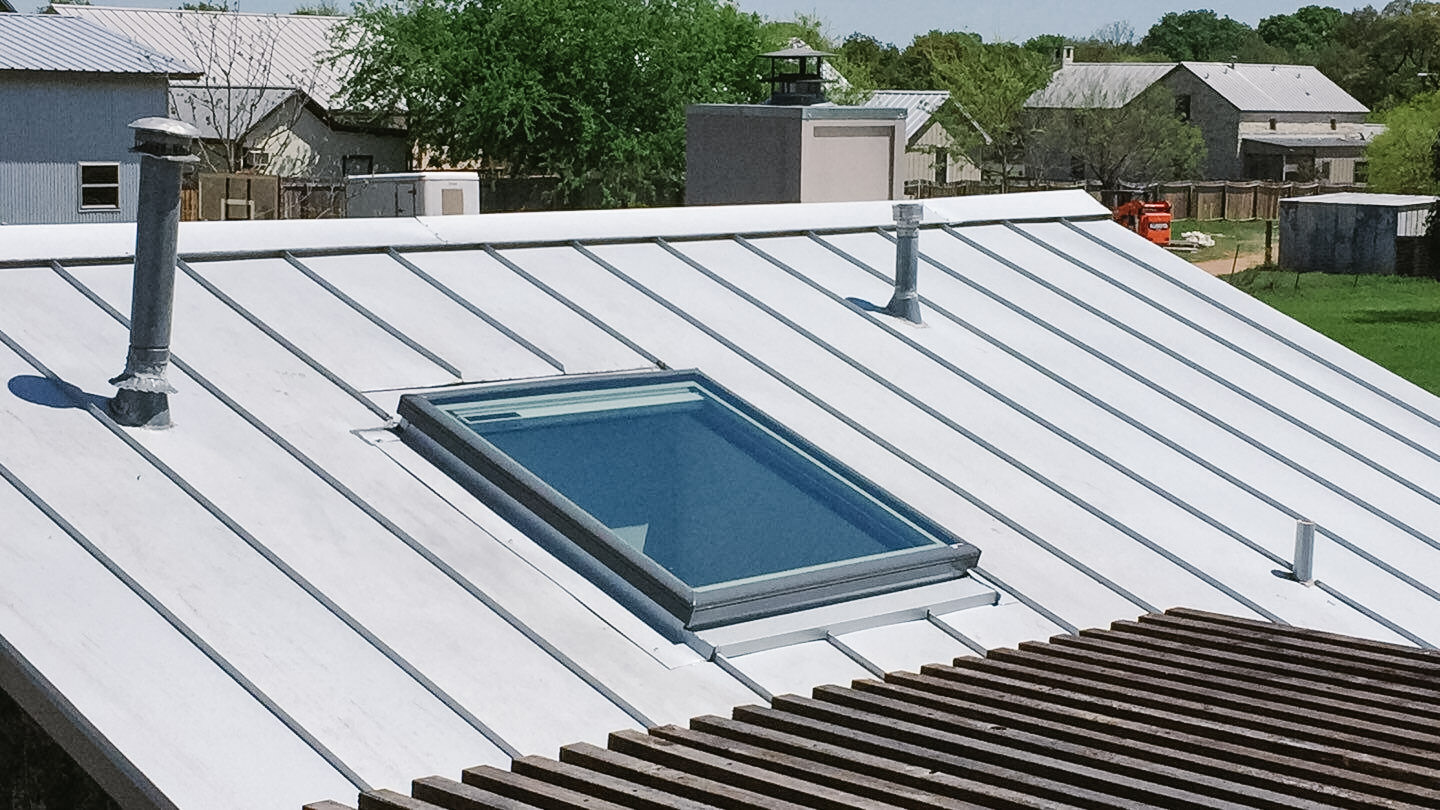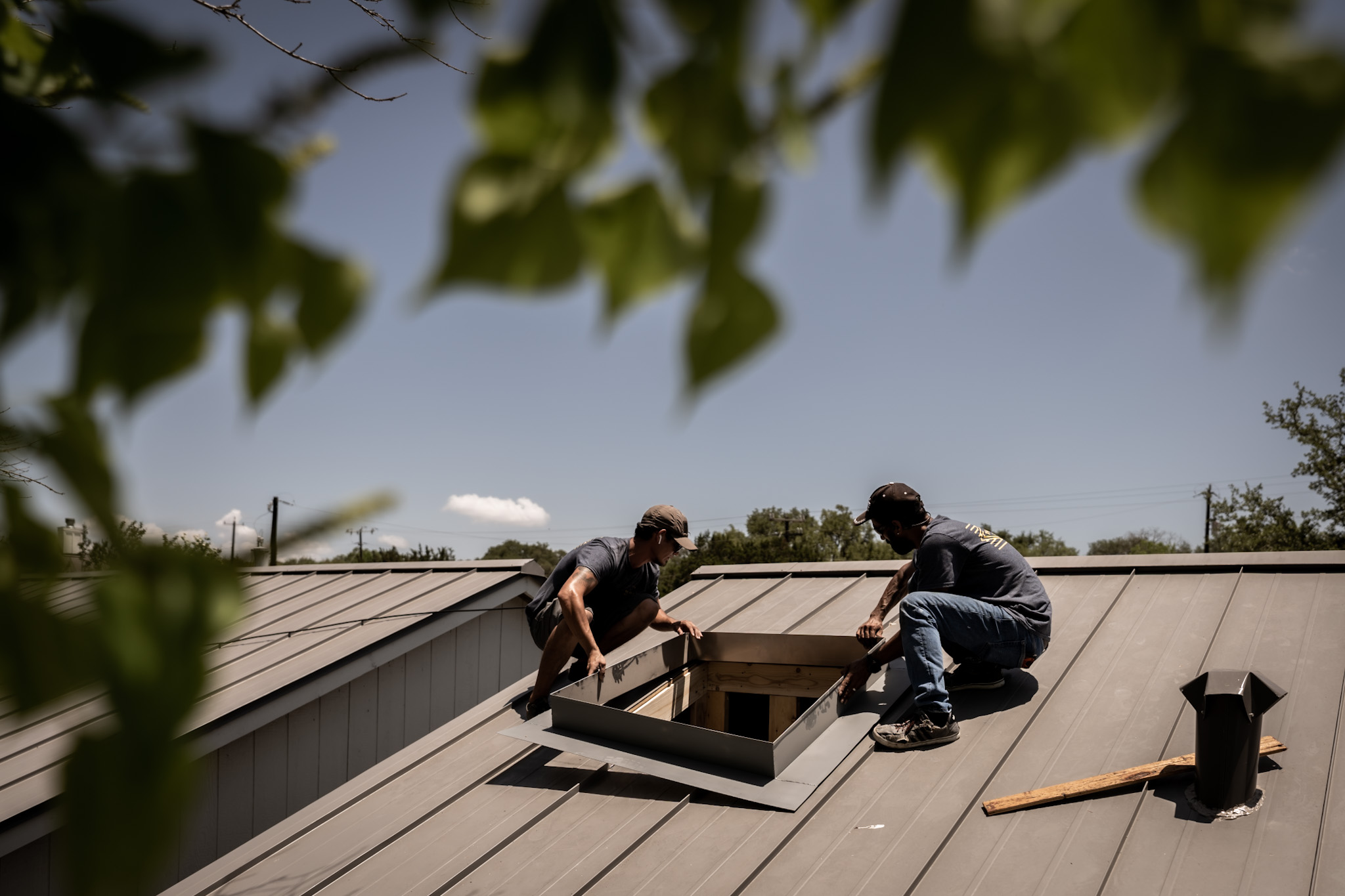At The Guild Collective we often get asked the cost difference between a traditional skylight and a tubular skylight.
A traditional 2×4 skylight with a 6-foot light channel brings in the same amount of light as a 14-inch tubular skylight. The cost of a traditional skylight starts at $2,500. The skylight would be installed by a trained, professional installer who would complete all of the roof and sheetrock work, as well as the painting. The cost of a tubular skylight, in comparison, is much cheaper and can start at $800. This installation does not require any alterations to the frame of your roof or sheetrock work and painting.
Your roof type, whether it’s shingle, metal or tile, as well as the pitch of your roof, can play a big part in the cost of a traditional skylight installation. Tubular skylights qualify for a 30% energy tax credit. Traditional skylights can qualify for the same tax credit when accessories like solar venting or solar blinds are added.
The range of price depends on your roof type and complexity. For example, is it a shingle, metal or tile roof? Additionally, tubular skylights qualify for a 30% energy tax credit. Traditional skylights do as well if you add accessories like solar venting or solar blinds to your installation.
You may be asking yourself when to install a traditional skylight versus a tubular skylight.
Most often you’re going to install a traditional skylight when you’re looking for a statement piece for a room to really draw in natural light and brighten a space. Or, you may not have a window in a certain room and would like to see outside or open the skylight for ventilation. Being able to see the sky, whether it’s the bright sunshine or a star-filled night, makes a huge difference in a space and the ambiance, and natural light makes rooms more inviting and enjoyable.

There are several benefits of a traditional, flat glass skylight. Let’s review some of them, and later on we will discuss differences and benefits of tubular skylights. At Guild Collective we install Velux skylight products and will be highlighting the line’s particular features in this article.
1. A slim side profile. The design of a flat skylight allows it to easily align with your roof, providing a seamless flow and a more modern look to a home or business.
2. A glass skylight has a near perfect transparency rating and won’t fade or yellow your flooring, furniture, artwork or curtains.
3. Glass is energy efficient. Skylights can be completely sealed and are therefore effective at keeping the heat in during the winter, and keeping the heat out during the summer. When the temperature is hot outside, a flat glass skylight with LowE3 protection can reduce heat gain in your home by 65%. On the contrary, when you’re trying to warm your home in cooler months, the argon gas between the double-paned glass keeps your home well insulated and helps retain heat.
4. Velux skylights are well insulated and even reduce unwanted noise from outside.
5. A flat glass skylight has a long life expectancy and requires little maintenance. Velux flat glass skylights offer a 10-year hail and 10-year no leak warranty. Velux skylights also come with a Neat® glass coating, which disperses water evenly, removing dirt quickly and reducing water spots to keep your skylight clean longer and ensure greater usability.
6. There are many accessories available with a Velux flat glass skylight. They offer three different types of shades to meet your specific needs. Their light-filtering shades and room-darkening shades are available in both solar-powered and manual styles. There are over 100 colors available and several patterns to choose from to help you design your unique space. Velux skylights are fitted with preinstalled brackets for easy installation and a seamless fit.
Install a climate control and monitoring system that pairs with your smartphone to create a healthier indoor environment. Whether you’re home or away, smart sensors continuously monitor the temperature, humidity and CO2 levels in your home, and can open or close your skylights and blinds right from your smartphone.
A plus, these accessories will qualify the installation for a 30% tax credit, which is a unique benefit.
Which flat glass skylight model is best for you? Let’s review four different Velux skylight models.
1. With Solar Powered “Fresh Air” Skylights, a small exterior solar panel captures all available daylight to power seamless skylight operation.
2. With Electric “Fresh Air” Skylights, a preprogrammed remote control allows you to open or close your skylights at your convenience or at scheduled times of the day.
3. With Manual “Fresh Air” Skylights, an operator hook makes it easy to open and close.
4. Fixed Skylights are an economical choice for visually expanding areas such as hallways, stairwells and other closed-in, dark spaces to create a spacious and light-filled home.
Tubular skylights bring natural light into your home but do not offer any view of the outdoors. A specially designed mirrored tunnel passes from the roof through a diffuser at the ceiling level and illuminates indoor spaces.

There are several benefits of a tubular skylight. Let’s review some of them.
1. Tubular skylights are more energy efficient and provide more light longer than traditional skylights because they are more effective at capturing light and diffusing it into the home. You will get 99% of the light coming into the tube, compared to just 36% with a traditional, flat glass skylight.
2. Velux traditional, flat glass skylights offer the option of a filter to reduce UV rays, but tubular skylights block UV rays completely at the dome so there’s no sun damage or color deterioration of clothing, furniture, or any fabrics.
3. There are no structural modifications required to install a tubular skylight, so they’re much easier and quicker to install and a lot more affordable. They start at about a third of the cost of a traditional skylight. Tubular skylights are not obtrusive on the exterior of a home, and on the inside they look like a standard light fixture.
4. Tubular skylights also provide one hundred percent color rendition, meaning you can see the true color of objects without any color shift. For example, if you’re trying to match black and navy socks, you will be able to see a distinction between the two colors.
How does a tubular skylight actually work? It all starts with a dome, which can be mounted with a leak-proof flashing on any rooftop, from shingle to tile and everything in between. The dome then catches daylight and channels it down through Spectralight® Infinity Tubing. This reflective tubing is much more efficient than a traditional drywall skylight shaft, which can lose over half of the potential light. It’s made of the world’s most reflective material that maintains brightness around corners and when light levels are low, such as in the early morning or late afternoon, on overcast days, or during winter months. It evenly illuminates dark areas of your home through a diffuser at the ceiling level that resembles a recessed light fixture. A full line of decorative fixtures is available, both round and square, that delivers beautiful, diffused light for maximum visual comfort and aesthetics. Accessories and add-ons provide options for brightening, dimming, ventilation and even integrated, solar-powered intelligent nighttime lighting to completely control your daylighting environment.
You may be wondering if a tubular skylight will draw heat into your indoor space. While the Spectralight® Infinity Tubing transmits the visible spectrum of light, it redirects the infrared wavelengths up and out, which is the main culprit in solar heat gain. These tubes are designed to have the heat transfer up and out, without being able to feel any heat gain at the fixture. Similar to a double pane window, tubing is sealed at the top and bottom, causing the heat to exit upward.
Where is the best place to install a tubular skylight in your home? Here are our top suggestions.
1. The kitchen
The kitchen is the most popular room customers choose to have a tubular skylight installed. Most current kitchens have granite or stone countertops. Under the fluorescent lighting in the kitchen, the colors and patterns on the granite and stone can look dull and dark. This can easily be resolved with a tubular skylight, which allows for one hundred percent color rendition, meaning you can see the true color of objects without any color shift.
2. A living room
Another area to consider is the living room because it’s a space where you typically spend the majority of your time. Natural light makes these spaces more inviting and desirable to be in and enjoy.
3. Any rooms or spaces that do not have a window
Any area of your home that does not have natural light coming in can benefit from a tubular skylight. A dark hallway, an entryway, the corner of a room, a bathroom, or even a laundry room will transition into a warm and inviting space.
There are different Solatube Daylight Systems for different areas. Let’s review, and you choose the configurations that are right for you.
1. The Solatube 160 ISn Daylighting System is our most versatile product and one that’s ideal for spaces under 150 square feet. The tube is 10 inches wide and up to 20+ feet long.
2. The Solatube 290 ISn Daylighting System can boost the brightness in bigger spaces. It is ideal for spaces that are 300+ square feet. Featuring a larger tube at 14 inches wide and up to 30+ feet long, it brings more light indoors for the brightest experience possible.
If you have any questions about cooling off a space, protecting your home, and controlling your utility bills, please set up your free in-home consultation today.





